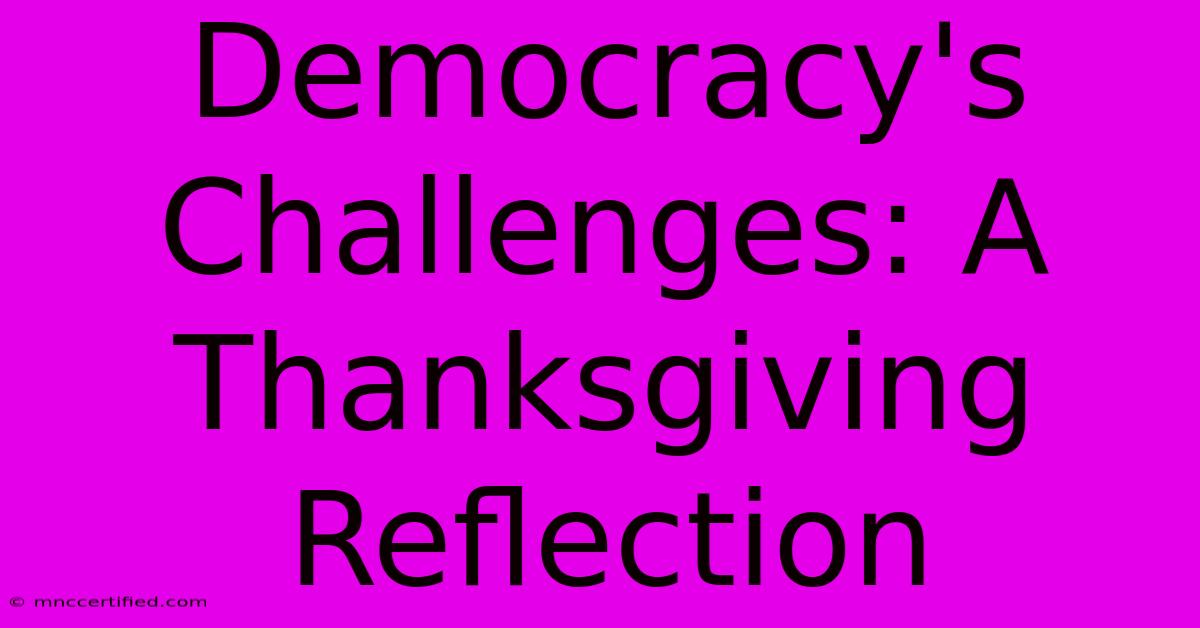Democracy's Challenges: A Thanksgiving Reflection

Table of Contents
Democracy's Challenges: A Thanksgiving Reflection
This Thanksgiving, as we gather with loved ones and reflect on our blessings, it's crucial to also consider the challenges facing our democracies. While we celebrate freedom and self-governance, the very foundations of our democratic systems are facing unprecedented stress. This article explores some key challenges, offering a framework for thoughtful consideration, not just this holiday season, but year-round.
The Erosion of Trust in Institutions
One of the most significant challenges facing democracies globally is the declining public trust in key institutions. This includes:
- Government: Political polarization, partisan gridlock, and the perceived influence of money in politics contribute to widespread disillusionment. The feeling that "the system is rigged" is a powerful disincentive for civic engagement.
- Media: The proliferation of misinformation and disinformation, coupled with the fragmentation of media landscapes, makes it increasingly difficult for citizens to access reliable information and form informed opinions. This "infodemic" fuels distrust and fuels division.
- Science and Expertise: The rejection of scientific consensus on critical issues like climate change and public health undermines evidence-based policymaking and fosters a climate of skepticism towards established knowledge.
How to combat this? Promoting media literacy, supporting independent journalism, and fostering transparency and accountability in government are crucial steps. Encouraging respectful dialogue and critical thinking skills across the population is equally important.
The Rise of Populism and Nationalism
The rise of populist and nationalist movements worldwide poses a direct threat to democratic norms and values. These movements often:
- Undermine democratic institutions: By challenging the legitimacy of elections, the judiciary, and other checks and balances, these movements seek to consolidate power and suppress dissent.
- Promote divisive rhetoric: Populist leaders frequently employ inflammatory language to scapegoat minority groups and stoke social divisions, undermining social cohesion.
- Restrict civil liberties: Freedom of speech, assembly, and the press are often curtailed in the name of national security or public order.
How to combat this? Strengthening democratic institutions, promoting inclusive civic education, and fostering cross-cultural understanding are essential. Countering misinformation and hate speech effectively requires a multi-pronged approach involving governments, civil society, and tech companies.
The Threat of Disinformation and Misinformation
The rapid spread of false or misleading information online poses a significant threat to democratic processes. This "infodemic" can:
- Manipulate public opinion: Disinformation campaigns can sway elections, influence policy debates, and erode trust in democratic institutions.
- Polarize society: The spread of divisive narratives can exacerbate existing social tensions and make constructive dialogue more difficult.
- Undermine the integrity of elections: Foreign interference and domestic disinformation campaigns can undermine the fairness and legitimacy of elections.
How to combat this? Improving media literacy, supporting fact-checking initiatives, and holding social media companies accountable for the content they host are vital. Investing in civic education to equip citizens with the skills to identify and resist disinformation is crucial.
Economic Inequality and Social Division
Growing economic inequality and social division create fertile ground for democratic instability. When a significant portion of the population feels left behind or marginalized, they are more likely to:
- Support populist and extremist movements: Feelings of resentment and frustration can lead people to embrace radical ideologies that promise radical change.
- Become disengaged from the political process: Apathy and cynicism can lead to low voter turnout and a weakening of democratic participation.
- Engage in violent or disruptive actions: Extreme inequality can fuel social unrest and violence.
How to combat this? Addressing economic inequality through progressive tax policies, investing in education and job training, and strengthening social safety nets are essential. Promoting social inclusion and fostering a sense of shared national identity are equally important.
A Call to Action This Thanksgiving
This Thanksgiving, let us not only celebrate our freedoms but also recommit ourselves to protecting and strengthening our democracies. By engaging in informed discussions, supporting democratic institutions, and actively participating in civic life, we can contribute to a more just and equitable future for all. Let this be a time of reflection, a time for action, and a time for renewed dedication to the ideals of democracy.

Thank you for visiting our website wich cover about Democracy's Challenges: A Thanksgiving Reflection. We hope the information provided has been useful to you. Feel free to contact us if you have any questions or need further assistance. See you next time and dont miss to bookmark.
Featured Posts
-
Thanksgiving Fixings Last Minute Guide
Nov 28, 2024
-
Phase O Matic Phase Converter
Nov 28, 2024
-
Putnam Investments Stock Price
Nov 28, 2024
-
113 Bond Drive Morganville Nj
Nov 28, 2024
-
D B Cooper A Familys Revelation
Nov 28, 2024